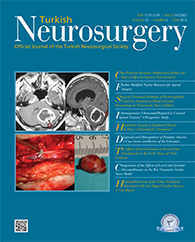2Ankara Numune Education and Research Hospital, Department of Neurosurgery, Ankara, Turkey
3Ankara University, Faculty of Medicine, Department of Histology-Embryology, Ankara, Turkey DOI : 10.5137/1019-5149.JTN.7471-13.0 AIM: This study aimed to investigate the effects of a new generation antiepileptic agent, levetiracetam, on the neural tube development in a chick embryo model that corresponds to the first month of vertebral development in mammals.
MATERIAL and METHODS: Forty-five Atabey® breed fertilized chicken eggs with no specific pathogens were randomly divided into 5 groups. All of the eggs were incubated at 37.8±2°C and 60±5 % relative humidity in an incubator. Group A was control group. The other eggs were applied physiological saline and drugs at a volume of 10 μL by the in ovo method at the 28th hour of the incubation period. Group B was given distilled water; Group C, physiological saline; Group D, Levetiracetam (L8668) at a dose equivalent to the treatment dose for humans (10 mg/ kg), and Group E, Levetiracetam (L8668) at a dose of 10 times the treatment dose. The embryos in all of the groups were removed from the shells at the 48th hour and morphologically and histologically evaluated.
RESULTS: Of the 45 embryos incubated, neural tubes of 41 were closed and the embryos displayed normal development.
CONCLUSION: Levetiracetam, at a dose equivalent to human treatment dose and 10 times the treatment dose, was shown not to cause neural tube defects in chick embryos
Keywords : Levetiracetam, Chick embryo, Neural tube defect




